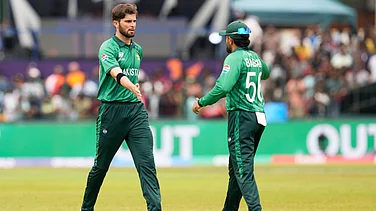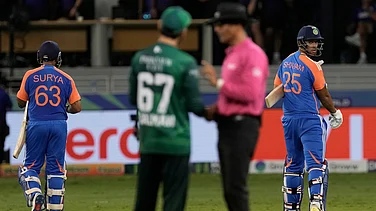INDIAN tours of England rarely pass without controversy or drama. However, the Navjot Singh Sidhu affair is an extraordinary one on all accounts. On May 25 during the Headingley one-day international, Sidhu was a moody but valuable member of the side. He had a one-day average of 40, which is better than even Sachin Tendulkar's, and there was no doubting his grit and ability.
But the next morning, he was dropped and within 48 hours the world of Sidhu and Indian cricket turned upside down. How did it happen? The simple answer seems to be man-management, or the lack of it. The satraps of the Indian tour of England appear to have cruelly mishandled Sidhu and, thus, produced potentially the worst tour of England since 1936.
That was the tour when Vizzy, no more than a club cricketer, captained India because he was a maharaja. He came with 36 bags of luggage and two servants to England before the Tests began and about the same time on the tour as Sidhu went home he sent Lala Amarnath back to India. It led to a committee of inquiry headed by a high court judge. It will be interesting to see if a commission is appointed over Sidhu's voluntary departure. Certainly there is a lot to investigate.
Sidhu is a loner. In an Indian cricket team not given overmuch to books, he liked to read. He reads a great deal about Rajneesh apart from many other subjects. Also, after Rajesh Chauhan went out of the scene, he had no mate in the team. He shared a room with Saurav Ganguly, the cultured Bengali left-hander. But in an Indian team where seniority matters—and Sidhu was the longest-serving member of the team, having made his debut a year before Mohammed Azharuddin—he felt his seniority was not given due recognition.
He felt it all the more in the way he was told why he was not playing in the Old Trafford one-day international. The decision was arrived at by the Indian tour committee of Sandip Patil, Mohammed Azharuddin and Tendulkar on what is called cricketing grounds. In other words, they felt Sidhu, who had run himself out at Headingley, needed to be taught a lesson. Ditto: Sanjay Manjrekar.
However, the way they went about administering this lesson is what did the damage. The teamsheet was pinned up on the dressing room notice-board on the morning of the match. Azhar went out to toss and, on winning, decided to bat. Sidhu, who likes to be ready early, donned his pads—he knew he would open or, as at Headingley, come in at number three. The rest of the dressing room, aware that Sidhu had been dropped, laughed. It is said that one member even cracked a Sardarji joke. It was only after this that Sidhu was told by Patil that he was not playing.
Sidhu was mortified to find his colleagues laughing. He was particularly incensed that Azharuddin laughed with the rest of them. He told The Hindu cricket correspondent R. Mohan: "The captain dropped me, then laughed, that f***er."
It was an unbearable blow to his pride. Sidhu spent most of that Sunday in a personal purgatory. He could not sleep that night. He felt his whole dignity had been besmirched. Sidhu has been dropped before. And, as is often the custom in India, sometimes his exclusion from the team has been disguised as a 'lack of fit-ness' case—on spurious medical grounds—when Sidhu has been fully fit and quite eager and ready to play. The manner in which it was done at Old Trafford was just "the final straw".
By May 27 morning he had decided that the only way he could maintain his dignity was to go back to India. He met the Indian tour committee and gave tour manager C. Nagaraj a letter for the Indian board. Says Mohan, who saw him immediately afterwards: "Sidhu was very emotional and I saw tears in his eyes."
The Indian tour committee did try to persuade him to change his mind but he found their pleas self-serving. As Sidhu saw it, the more Nagaraj pleaded that he must take his decision only after the tour was over, the more convinced Sidhu became that the tour committee was being selfish and not doing anything to make him feel welcome.
The Indian team travelled from Manchester to Essex that day and there followed more meetings between Sidhu and the tour committee. At one of these meetings on May 28, Azharuddin did ask Sidhu: "Why do you want to go?" Sidhu's reply was that he had made up his mind and he would not change it. A conference-call with I.S. Bindra, the Indian board president, could not make him change his mind and Sidhu departed.
By the time he did, Salil Ankola had been contacted, although the Indian cricket tour manager insists that the cricketer's call-up from his league club in Newcastle was not a direct result of Sidhu's departure. It seems a decision had been taken just before the one-day international that the bowling department needed to be strengthened and that India, who have come on this tour with just three seamers, needed an extra one. Patil, diplomatic as ever, refuses to criticise the selectors for sending a team to England on an early season tour with four spinners, two of them leg-spinners, but Ankola's call-up is an implied criticism of the selectors.
In cricketing terms, it means Vikram Rathore will now open with Ajay Jadeja. So India will have one opener untried at Test level and one who has not been a complete success. Ganguly, whose batting at Old Trafford was both elegant and decisive, will now make his Test debut, probably coming at number six. Being the only left-handed batsman in the team, he will, as he did at Old Trafford, make a difference and he is the only little bit of good to come out of this dreadful Sidhu affair.
HOWEVER, the Sidhu affair raises other questions about tour management, especially on this tour. Even before Sidhu made his dramatic exit, there were mutterings in the Indian camp that this tour was badly organised and handled. The players, particularly captain Azharuddin, were upset about the size of their rooms. Like all modern tours, this one is governed by a guarantee. The English board is paying the Indians some half-million pounds. The Indian team must manage its own expenses, including hotels and coaches, and the policy of the Indian board is that every tour must be self-financing. So, while the Indian board has shared equally with Pakistan profits in excess of $60 million from the World Cup, none of that money has come to this tour.
However, even half-million pounds should provide good hotels but it seems the Indian board told the agent handling the tour that it was not prepared to pay more than £65 for double rooms. This meant the first hotel they stayed in London had very small rooms. After players demanded a change, the management did decide that when they returned to London the team would stay at the Regents Park Hilton. They were based in this hotel back in 1986 when they won at Lord's for the first time.
More than hotels, there is the question of tour discipline and the relationship of the captain with the players. Here, Azharuddin has got special permission to have girlfriend Sangeeta Bijlani with him, both in team hotels and on the team bus. Tendulkar's half-English wife is also with him.
Against this relaxing of rules on wives, there has been a corresponding hardening of rules on the treatment of senior players. A policy was adopted that any player, however senior, would be liable to be dropped. This was behind the decision to drop Sidhu and Manjrekar for their running between the wickets. As a decision, it may have had merit. But it was done in such a hamhanded fashion that it might take a long time for Indian cricket to recover.
There is also the question of how Azhar has had handled the media. Ever since Sidhu's departure, he has said little except for delphic comments like "the game is greater than the player and nobody should behave like schoolboys". He has expressed sorrow that too many senior players now leave the game in bitterness or with some controversy attached to their name. He says he is determined to leave the game with dignity and honour. One hopes he does. His batting feats will be remembered, but his handling of the Sidhu affair and his aloofness on the tour suggest that he has almost vacated the captaincy.
But what is the legacy he will leave Tendulkar? This tour suggests that the Little Master will have to do a lot of rebuilding. Not a happy omen for a tour which was never going to be easy in the first place but could now be impossible to salvage.






















